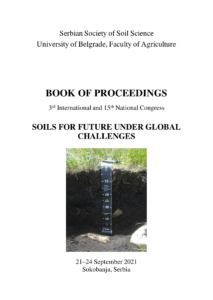 Title: Impact of nature based solutions for flood risk management on soil and agricultural development – EU consideration and Serbian prospective
Title: Impact of nature based solutions for flood risk management on soil and agricultural development – EU consideration and Serbian prospective
Abstract
Throughout history, floods have played one of the most important roles in soil formation, maintenance and modification of soil fertility. Flooding of rivers left mud full of organic matter in the fields, salts were washed out of the soil, and a large amount of water was retained in the soil profile. Urbanization on the banks of rivers, regulation of water flow, and construction of dams for flood control narrowed river beds and increased hydraulic flow, resulting in greater concentration of flood waves during floods and shortened flood control times. Since the beginning of the 21st century, numerous large floods have occurred across Europe. Various climate models suggest an increase in the frequency and intensity of future flood events. Dams were built to accommodate flood waves with a return period of 50 years on smaller watercourses and 100 years on large rivers. Floods with higher return periods may or may not occur at all. In this respect, dams are no guarantee that towns and agricultural land can be successfully protected from flooding, so their enhancement is questionable. In recent decades, there has been extensive debate about the use of agricultural land for flood protection of cities and industrial areas, about the cost of land and agriculture. Since private property is involved in both cases, a compromise solution should be found that satisfies all parties. The main theme of the COST project LAND4FLOOD is to consider all aspects of flood risk management and land management, such as.: geographical, hydrological and hydraulic, ecological (soil pollution, compaction, water retention, ecological services, habitat restoration), agricultural (agricultural development in the area reserved for temporary water retention), economic (how to compensate damages or provide incentives for flood retention, public subsidies), public participation (how to ensure the participation of landowners), property rights issues (how to allow temporary flood retention and what does it mean for agricultural use) and sociological. The aim of this paper is to present some reflections on flood risk management and its implications for land and agricultural development in the EU, as well as some considerations on the implementation of the NBS in Serbia from the perspective of flood protection, land protection and agricultural development.
Full citation: Stričević, R., Srđević, Z., Đurović, N., Lipovac A., Kapović Solomun, M., Zupanc, V., Potočki K. Impact of nature based solutions for flood risk management on soil and agricultural development – EU consideration and Serbian prospective. (2021). 3rd International and 15th National Congress of Serbian Society of Soil Science and Faculty of Agriculture, University of Belgrade (Serbia) 21-24 September 2021 Sokobanja. Book of proceedings pp. 210-218
Full text available here.
